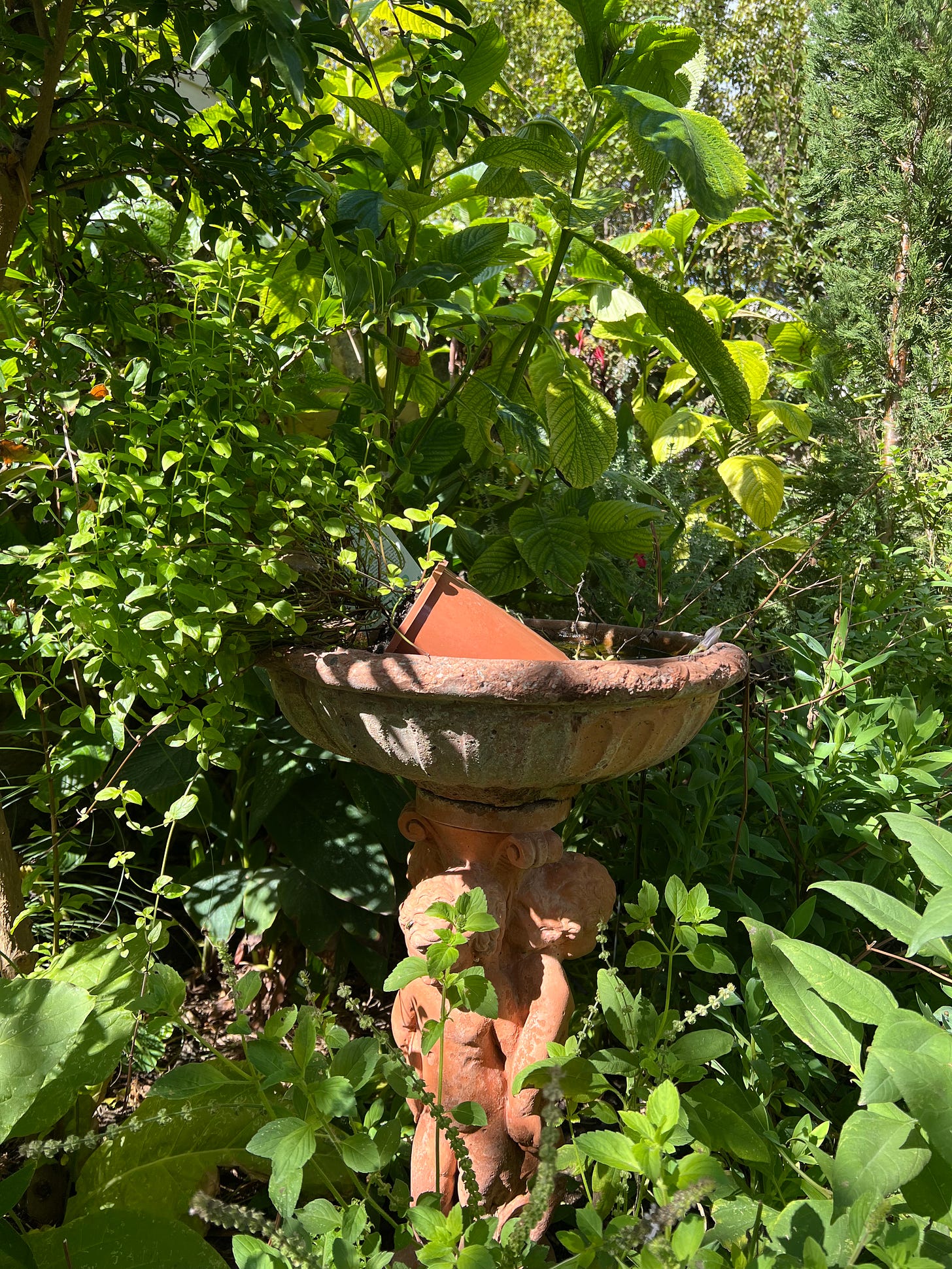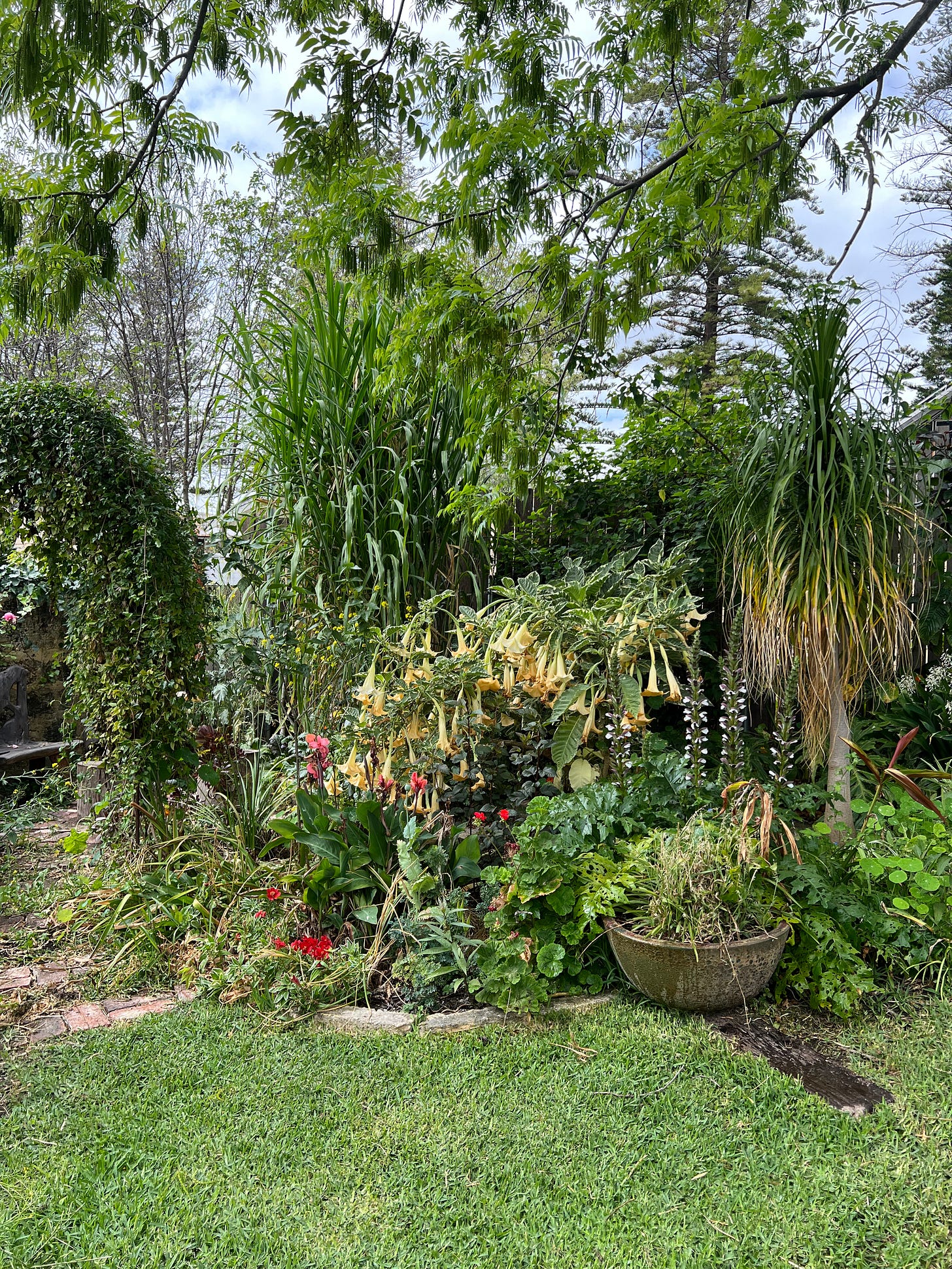This summer, I grew a bunch of corn with our son. I didn’t grow it from seed because I’d left it too late. We bought nearly-out-of-season seedlings in late February and shoved them in the ground haphazardly (if you’ve tried planting seedlings with a toddler you’ll know it’s a win if the seedlings aren’t instantly pulled out and ‘replanted’ elsewhere as soon as they’ve gone in).
The plants didn’t grow very big, and I forgot to harvest them on time. When we eventually picked them, the cobs ranged from small to really small, with patchy kernel formation and half of them were already starting to dry out.
And it got me thinking about the point of growing a garden. Because I think 99% of the people who read my newsletters or follow me on Instagram would consider this a failed crop. And, looking objectively at the situation, they’re probably right. But then I tried looking at it from the perspective of my two year old…
He planted seedlings in the ground. He watched them grow - painfully slowly (instant gratification be damned!). He unwrapped the cobs (in our bed, which is now littered with weird silk strings, giving the impression that either my husband or I have exceptionally thick, gold-white hair that is falling out at an alarming rate). More importantly, while we picked, he ate the only perfectly plump corn cob, direct from the plant, uncooked and sweet, in the sunshine. He now mistakenly thinks my husband is a corn farmer.
To consider this a failed crop would mean giving myself a very narrow definition of gardening success. And robbing myself of a whole lot of joy and satisfaction in the process. The thing is, there is no point to gardening, because there’s no objective point to anything we do in our little old lives. And when there is no objective point to an activity, you get to decide whether or not it was worthwhile.
But this is where we so often get led astray.
A quick google search of ‘what’s the point to gardening’ yields a tonne of list-based blog posts, citing benefits like: ‘gardening is good for you’, ‘you can grow delicious fruits and vegetables on your doorstep’, ‘it’s good for the planet’, ‘it grows relationships and community’ and ‘it increases the value of your property’.
All these points are no doubt true. All these points have motivated me in the garden in years gone by (except the property one, I highly doubt the eclectic jungle in our backyard would survive a change of property ownership, which is why I will LIVE AND DIE ON THIS BLOCK).
Anyway.
There’s nothing wrong with those lists of benefits, but yesterday I started thinking about them from my current position in life (a bit overstretched, tired, and reasonably incapacitated by the predictable physical decline of third trimester pregnancy). In our garden right now, a river mint sits on its side, in a plastic pot, wedged into the green, slimy water of our bird bath, because I couldn’t be bothered to water it or plant it. A lavender plant wishes it was so lucky; instead of watering or planting it, I have just left it to die. There is a towering, highly unsafe pile of limestone blocks that I will almost certainly not get around to moving or laying for the next 6-12 months, and a brittle skeleton of some once-beautiful Moroccan mint sits in a pot that has been missed by the Retic for a little too long (see my gallery of sad, sad pictures, below).

The ‘delicious fruits and vegetables growing on my doorstep’ are a basket of past-it corn (which I just threw in the compost), some oranges (actually v good), and two bunches of bananas (also good!). If my metric of garden success is a beautiful, well manicured garden, a rise in property prices or a bounty of fresh and delicious fruits and vegetables, I’m failing on all counts. And sometimes I do walk around the garden, imagining the beds look the way I truly want them to - thoughtfully planted with healthy, nurtured plants, in the style of Brenton Roberts (a garden designer in the Adelaide hills), Piet Oudolf (one of the pioneers of the ‘new perennial’ naturalistic garden style - his gardens are incredible), or good old Monty Don. But this isn’t the time in my life to aspire to that kind of garden. And I’ve been pleasantly surprised by how relatively easy it has been to redefine success in the garden for this particular season.
The point of our garden, for me, right now, is to subtly, gently, and slowly but surely indoctrinate our son into an all-consuming plant addiction. Without him even realising I’ve done it.
So who cares if he picks flowers that have no stems attached and tries to stick them directly into my ear? Who cares if the corn he munches on is a tenth the size of a regular cob, or my poor, poor portulaca has been uprooted from its pot at least once a week since I planted it? None of those things actually matter. None of those things undermine my ultimate goal. And none of them preclude me from, eventually, becoming an anally retentive garden control freak once again, when my kids are old enough to comprehend the length and breadth of my own garden obsession.
You might not have kids and you might not be in the same stage of life as me, but I think there is a valuable lesson that applies to every gardener and their garden. We set ourselves up for shame, disappointment and defeat when we assume our gardens need to provide us with a specific set of things. Or when we ask too much of them (or, more likely, of ourselves) at any given time. The internet paints a picture of ‘what it’s like to grow a garden’ that is unattainable for almost anyone who has a life that is remotely busy. And if you base your measure of success on those metrics, you’ll almost certainly feel like a failure.
It is, truly, possible to grow a thoroughly imperfect garden that you find genuinely beautiful - one that makes you happy. In fact, it’s possible to focus so intently on what is beautiful about your garden - what is working, what is exciting - that you stop even noticing the imperfections. I’m reminded of this every time someone asks me what’s eating one of my plants, because they’ve noticed small holes in the leaves that went completely under my radar. I just don’t see most of that stuff anymore. And when I do, I very rarely care.
Instead, I see Carnaby’s cockatoos in our pecan tree. I see the salvias blooming, I smell their spicy, fragrant leaves. I glow with pride as our boy correctly identifies wattlebirds, kookaburras and mudlarks, and watch him as he cradles slaters in his tiny hands and takes them to new homes in the garden. I remember what my own childhood memories were of - fresh fruit eaten direct from the tree, shady, leafy hiding places, and handfuls of sweet peas. In none of my memories did I register whether a garden was perfectly planted or whether there were dead patches of grass in the lawn.
Gardens fail, not because they are imperfect, but because somewhere along the way, the people who grow them lose motivation, lose interest, and give up. And there is nothing more demotivating than thinking you are doing something wrong. So here is my singular piece of advice for your garden this week: just care a little less about almost everything out there (most of our perceived garden problems really - truly - don’t matter), and, instead, try seeing your garden through the eyes of a two-year-old, tasting a fresh corn cob for the very first time, or a 99-year-old, smelling a spicy, fragrant winter stock for the very last time.
There is so much boundless joy to be gained from growing a garden, all through our whole lives, and none of it requires perfection. And none of our perceived ‘problems’ matter a whit if you still find yourself smiling when you’re out there.
Thank you for reading! See you next time for more Lo fi life!
If you’d like to access all my garden guides and the full archive of recipes and posts, you can upgrade to a paid membership by clicking the button below.
And if you enjoyed this newsletter, please feel free to share it with your friends!









Haha I needed that bit of insight. What a lovely garden you have. I remember all those times when my boys were little and it is so heartwarming to hear of your little ventures into the garden. Too quickly they grow up. And my garden is a bit more organised but the birds don’t seem to mind sharing their water with a few leaves or a plant or two. Enjoy your babies 😊❤️
So very, very, very relatable, right from the corn to the poor plant being pulled up almost weekly (for me it's an aloe) haha BUT the joy of babies sitting in the tomato patch covered in red, and excited squeals for insects & birds & skinks.... 🩷